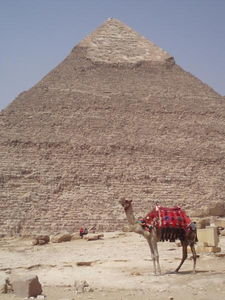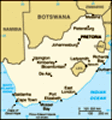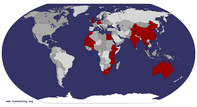Advertisement
Published: January 2nd 2008

 Pyramid and camel
Pyramid and camel
Amazing monuments and amazing animals. Egypt, March. My dream as an 8-year old was to come to Africa, and kiss a wild hippo. Yes, weird, I know. Perhaps I shouldn't have revealed that little nugget of information. Nevertheless, the history, the mystery, and the tragedy of this immense land has attracted me for years.
Finally, around ten months ago, I had the funds, the air ticket, and the time to launch my own exploration of at least part of this gigantic enigma. My aim was to challenge my own prejudices, and discover whether the stereotypes presented to us in the West were true. Who knows, maybe I would actually uncover some signs of hope and promise in these scarred lands.
And so, here I am, 34,280 overland kilometres and 19 African countries later. Or, to put it another way, 718-and-a-half hours (that's 30 days) in 160 buses, taxis, ferries, cars, bicycles, scooters, trains, dhows, canoes, motorcycles, and on camelback, later. Or, if you prefer, 102 hotels, six dormitories, five campsites, four train seats, three ferry floors, two bus seats, and two caravans later. It's been a long, tough journey, taking in elements of North, West, East, Central,

 Saharan house
Saharan house
A deserted dwelling in the Sahara desert. Egypt, April.and Southern Africa; yet still I have seen only one-third of the nations on this continent, and most of them just fleetingly. I don't pretend to have the answers to the question, 'What is Africa?', but I have discovered much during this trip. I'm about to bore you with those discoveries in a moment, but first, let me tell you the greatest, and the most surprising, of all:
Africa is not a basketcase. Africa is a continent with great vibrancy, great potential, great hope, and a great future. Blown away? So was I when I found out. This trip, for me, has been about debunking the myths that we hear about Africa (if we even hear about it at all), when it is the topic of documentaries, news reports, or history books. Through this blog, I have been attempting to pass some of my ideas and thoughts on to you guys. As I've said before, I don't pretend to know any answers, but this is what
I have come away with from travelling in certain parts of Africa.
I think its about time we got some good news from the place, so here is my attempt to

 Helwan
Helwan
Helwan the camel, a mate of mine from Dahab. Egypt, April.question some of those myths. And believe me, before I started my journey, I subscribed to most of these...
Myth #1: All Africans are living in grinding poverty Okay, a lot of Africans
are very poor. in fact, most of them are way poorer than we could ever imagine. But poverty is relative, and poverty does not define a person. Just because someone doesn't have a TV, or a car, or a dishwasher, and has to grow their own veggies, and build their own mud house, it doesn't make their life poor. Materially, yes, they are devoid of many things that we take for granted. But Africans are rich in other ways: families are more closely knit, their hard work is rewarded with fresh food on the table, leisure time is enjoyed with one's close friends in the village.
I'm not saying that poverty is an enviable state to find oneself in. But I am saying that poverty is not the be-all and end-all of somebody's existence. We have to stop seeing 'Africans' as an amorphous mass of 'poor people'. they are valuable, sensitive, hard-working individuals, with fulfilling and often happy lives, who just happen to have less

 Pure Luxor-y
Pure Luxor-y
Hieroglyphs on a pharaonic pillar at the Temple of Karnak. Egypt, April.objects and less opportunities than we lucky bastards in the West.
Myth #2: Africa is crime-ridden. If you believe the myth, you'd think that most tourists get separated from their backpacks even before they've set foot on the tarmac at Dakar International airport. The truth is, there
is a lot of crime in Africa. But there is also a lot of crime in New York, in London, in Madrid, in Bangkok, in Sydney, in Moscow. Crime is directly correlated to poverty, and people with nothing will try to get hold of
something any way they can. Some turn to crime. And criminals usually congregate where the riches are: tourist areas and big cities. So, places like Nairobi, Johannesburg, Maputo, or Dakar, tend to have high levels of crime. However, criminals do try to avoid violent crime where possible, as it gets them put into jail, and scares off the potential targets. So most crime in Africa consists of low-level scams and pickpocketing. No tourist is completely safe here, and some cities, such as Jo'burg (where I am now), are just plain dodgy, whatever the locals tell you. However, if you follow these very simple guidelines, you can have a

 Goat by the Nile
Goat by the Nile
A goat has a quick munch by the River Nile. Egypt, April.safe time in Africa:
*Don't walk around alone in cities at night
*Don't carry your valuables, certainly not in plain view of everyone
*Don't look lost
*Ask locals where the dodgy areas are
*Trust NOBODY - no need to be rude, just don't fall for anything without checking it first
Personally, I've been over-suspicious this year. Yet, in ten months, I haven't been robbed. I did lose US$20 to a couple of scam artists in Dar es Salaam, and 've encountered more than a few sketchy characters, but overall - Africa has been as crime-free as I could have hoped.
Myth #3: Africa is too dangerous. Closely related to No.2. Many people think that Africa is all about civil unrest, muggings, and war. Okay, Kenya is not doing too well today, and I was only there a few months ago; but overall the places I have visited have been fine. No riots, no knife attacks, no guns pointed at me, no bombings. The biggest danger for a tourist in Africa is road accidents - and there are a lot of them. The best advice I can give is this: as long as you're not visiting an African

 Watermelon Man
Watermelon Man
The man who sells the melons. Egypt, April.country during election time, just make sure you don't take a bus driven by a whisky-drinking maniac after dark. Then your personal safety shouldn't be too much of an issue.
Myth #4: Africa is always at war. Back in the 70s and 80s, I may have agreed with this. The way we see Africa in the news now, though, you'd think that the whole place was in constant conflict. Happily, that's not the case. In the 54 countries of Africa, we have a major war in the DRC, genocide in Darfur, a close-to-civil-war in Burundi and Cote d'Ivoire, and a godknows-what-to-call-the-mess in Somalia. Then there are some assorted bits of awfulness: Chad and Sudan clashing on their border, Zimbabwe's tensions, and bombings in Algeria. But the situation isn't half as bad as most people would think. The reality is this: most Africans want to live in peace, like anybody does, and most of them actually now
do live that way. As the era of democratisation and mass education progresses in Africa, such conflicts can only decrease. I hope...
Myth #5: Africans are all living with famine. Most people hear the word, 'Ethiopia', and instantly they picture an emaciated

 The Alexandrian Corniche
The Alexandrian Corniche
The seafront at Alexandria.
Egypt, April.child with sunken eyes and a swollen belly, sitting helplessly in some flyblown patch of desert. That image is so powerful that many associate it with the whole continent. The truth is - most Africans grow their own food, and they grow enough to survive. Yes, there is a lot of malnutrition, especially amongst kids in the Sahel region of West Africa, but very few Africans are currently dying of starvation. There are periodic famines, usually associated with drought (global warming isn't helping), but most countries are doing - well, not fine, but okay. And, here's the surprise: Ethiopia has a varied and delicious cuisine, and more restaurants than you could possibly imagine. The famine there in the 1980s was caused by the communist dictatorship, for political reasons.
Myth #6: Africa is completely disease-ridden. Again, let's get this in perspective. Africa does have a lot of diseases, and a lot of people dying from them. South Africa has six million people with HIV. Up to three million people die each year of malaria all over Africa. Many people are killed or incapacitated by diseases almost unknown in the West, such as TB, cholera, or Ebola. But things are improving.

 Hassan II Mosque
Hassan II Mosque
The gigantic mosque that dominates the Casablanca skyline. Morocco, May.As education levels increase, people are learning how to take simple hygiene and lifestyle measures, to avoid disease. Government campaigns to inoculate children, and provide medication for HIV sufferers, are cutting mortality rates. Disease
is an issue for many Africans - but like poverty, it is something that people learn to live with, and it does not singularly identify somebody. People with HIV still live fulfilling and valuable lives, and don't just curl up and die. HIV is just one part of their identity.
Travellers can catch awful diseases here - my girlfriend caught malaria in Ghana - but staying aware of the risks, taking preventive measures, and getting straight to medical care, are usually enough to keep you healthy. Disease is a reality here - but it is not as unmanageable as many would believe.
Myth #7: Corruption is endemic in Africa. Before I arrived here, I thought that I would be getting stopped in the street every five minutes, and shaken down for a quick 'gift' to enable me to go on my way. In the past ten months, I have been asked for a bribe four times. I haven't paid once. That's not to say that

 Chefchaouen street
Chefchaouen street
Inside the blue-and-white medina of Chefchaouen. Morocco, May.corruption isn't an issue here. It most certainly is. Most governments here are corrupt, and in some countries, for example, Kenya and Mozambique, it is blatant and systemic. Corruption is rife on a governmental scale, with vote-rigging (Kenya again), nepotism, patronage, and tribalism all evident in many countries. But, on a micro-level, it is simply not as bad as most people make out. Africa may be full of thieving dictators, but most cops, immigration officials, and civil servants that you meet, are just honest people, trying to do their badly-paid job.
Myth #8: Africa is a basket-case. No, no and no! As I've said, disease and poverty do not define a person, or a country, or a continent. Africa has more than its fair share of tragedy, but it is not beyond help. Travelling here has filled me with hope for this place: most Africans are full of a lust for life, a desire to get ahead, and hope for what is to come. They enjoy life and hope for a brighter future. Why should we in the West, who don't know them, dismiss them all as 'helpless and hopeless'?
Myth #9: Africa is a single entity. I

 Smoky Fes
Smoky Fes
Overlooking the ancient city of Fes. Morocco, May.make this very mistake myself, constantly. I keep calling Africa, 'Africa', as though it is one convenient object or concept. What I have discovered this past year is just how diverse this place is. It's not all black guys, mud huts, and zebras.
I have met Africans from the North, from the West, from the East, from the South.
I have met Arab Moroccans, Wolof Senegalese, Kikuyu Kenyans, Hutu Rwandans, and Zulu South Africans.
I have met Egyptian Muslims, Ethiopian Jews, Cape Verdean Catholics, Ugandan Protestants, and Tanzanian Hindus.
I have met French-speaking Togolese, English-speaking Malawians, Portuguese-speaking Mozambicans, and Amharic-speaking Ethiopians.
I have met Mauritanian camel drivers, Ghanaian minibus drivers, Kenyan safari drivers, Malian cattle drivers, and South African Mercedes drivers.
I have met survivors of civil war, victims of torture, exiles from conflict, and victims of AIDS.
I have met witch-doctors, farmers, hunters and chiefs.
I have met beggars, policemen, teachers and lawyers.
I have met jet-black West Africans, pasty-white South Africans, and every shade in between.
I have seen turquoise oceans, and shit-ridden beaches.
I have seen glorious monuments, and broken-down slums.
I have seen stunning landscapes, and environmental degradation.
And I've loved and savoured every 
 Spicy tea guy
Spicy tea guy
A merchant selling spiced tea in the Marrakech medina. Morocco, May.moment of it. I thoroughly recommend you visit this incredible continent.
Cheers for reading! For that last little taste of the trip, there'll be one more blog entry...just for fun.
Advertisement
Tot: 0.346s; Tpl: 0.015s; cc: 23; qc: 115; dbt: 0.186s; 1; m:domysql w:travelblog (10.17.0.13); sld: 1;
; mem: 1.4mb






















Caitiln
non-member comment
what a great insight - unfortunately most of us know very little of Africa but don't let that get in the way of the prejudices and stereotypes referred to. Be great to have you back mate, when you do eventually re-appear.